HomeReviewsMetaphor: ReFantazio
Metaphor: ReFantazio review: like a brilliant fantasy Persona, only with one major catchIt’s wonderful but…
It’s wonderful but…
Image credit:Rock Paper Shotgun/Sega
Image credit:Rock Paper Shotgun/Sega
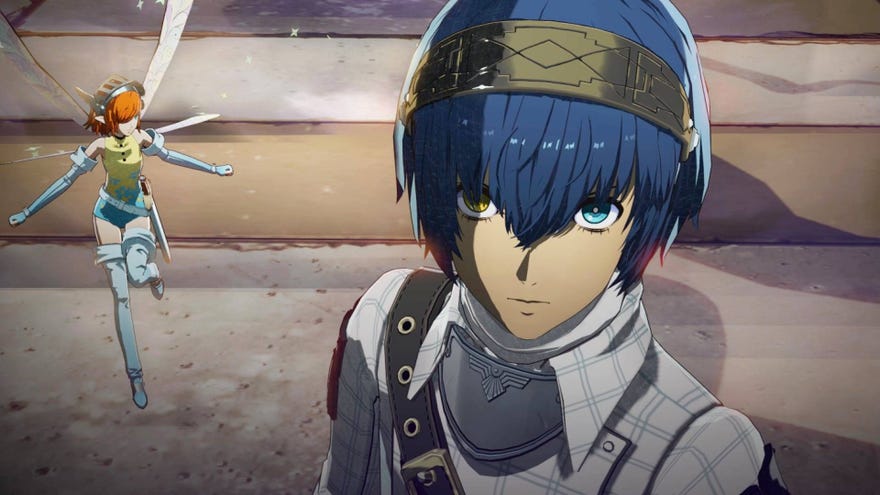
Graham asked me if I’d discovered what the metaphor inMetaphor: ReFantaziomight be, and I replied, “I don’t know haha”, or something along those lines. Having given it more thought, I think there are two metaphors: 1) It plays quite likePersona. 2) Its story is like a commentary on our society… or something to that effect.
Metaphors aside, though, the game is a gigantic fantasy RPG that’s technically better thanPersona 5in a lot of ways. Structurally, it feels less repetitive. It has more animated cutscenes that elevate those key story moments. You can brush aside weaker enemies in real-time combat, rather than face them in tiresome turn-based tangoes. And overall, I think it’s the best game Persona or Persona-like Atlus have put out - it really is brilliant. But there’s a part of me that feels like it’s missingsomethingthat’ll leave it less ingrained in the memory than Persona 5 once its final chapter has closed.
You’ll chat to this mysterious fella who researches Archetypes and sets you increasingly difficult challenges like: “Level up this Archetype to 15”. It’s well worth doing them, as they can lead to some really strong bonuses. |Image credit:Rock Paper Shotgun/Sega
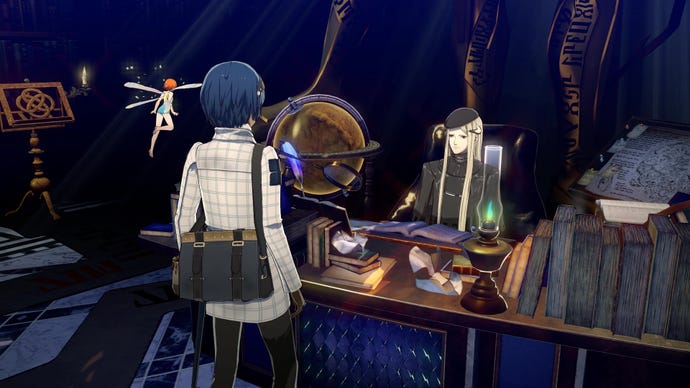
If you’re an anime-liker, you’ll get on with Metaphor’s earnestness and its overarching lesson: Racism is bad! Be nice to each other! Democracy rules! If you’re someone who doesn’t get on with obvious messaging, you’ll wrinkle your nose at it constantly, like someone trapped in a realm where they’re forced to cut their nose hair regularly. But I will say that the story, while sometimes predictable, chucks in enough twists and a sense of discovery to keep things from ever falling flat.
The story really gets going once you’ve got the Gauntlet Runner, which is around ten hours in. |Image credit:Rockl Paper Shotgun/Sega
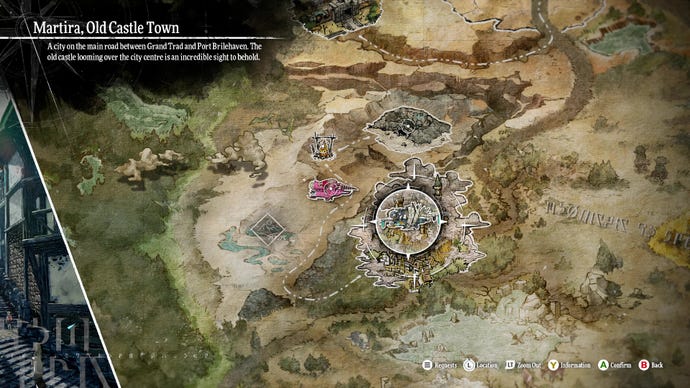
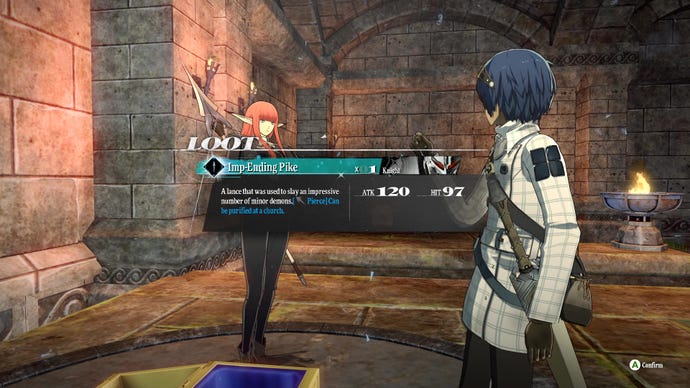
Conveniently, a lot of fetch quests have you collect stuff from towns that are enroute to dungeons, which are natural endpoints. All you need to do is select the route you want, take into account how many days it’ll take to travel, then hit the “let’s go” button.
It’s these excursions that make up the bulk of your adventures then, as you must portion time to conquer these dungeons. And as you travel between them, you’ll have further opportunities to chat to your pals, sink into a hot tub, cook dishes, and occasionally fight invaders. Again, all of it lends the game a greater sense of dynamism and adventure than Persona.
Metaphor does retain one key thing from its forebear, though, and that’s each major character awakening to their own magical Archetype: a class that lets them do spells that consume MP as opposed to thwacks with their swords or maces that don’t consume anything. As the generic anime lad, you awaken to the Seeker first, a do-it-all hybrid swordfighter who can wield magic and, largely, exists as a sort of vessel for inheriting skills from other classes. Your main squeeze Strohl awakens to the Warrior. The red-haired glutton Hulkenberg, the Knight. Make friends with characters who look entirely different to every other civilian asset in the game and you’ll unlock new classes (the Brawler being one of the earliest, and in my opinion, one of the best). Further these bonds and you’ll unlock benefits for them, like extra skills and slots, or even benefits outside of combat like better bounty rewards.
Choose classes from certain schools and they’ll unlock Synthesis abilities for use in battle. These are basically powerful team-up skills that use two turns instead of one. Despite their cost, they can really turn the tides and look very cool to boot. |Image credit:Rock Paper Shotgun/Sega
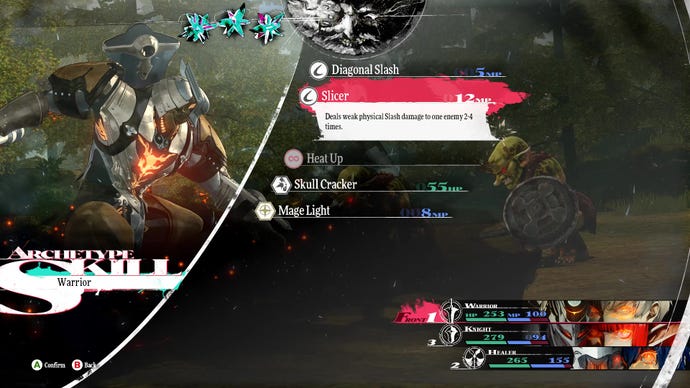
To get levelling, you’ll spend a lot of your spare time in dungeons. Many of these are a sight better than Persona’s, as they’re the beneficiary of some strong quality of life updates, including more convenient save points and enemies not respawning when you rest. They offer more variety, too, like getting to fight through a creature’s insides as a timer ticks down and slippery fish enemies rob you of precious seconds. Some dungeons are “Infiltration” missions, where you have to defeat enemies in a certain number of turns. Others feature stealth sequences, where you knock out guardsMetal Gear-style.
Still, though, fighting through these dungeons demonstrates that many of Persona’s failings remain. Some dungeons are just annoying corridor mazes with multiple, samey floors. Restricting turns adds urgency and strategy, sure, but also makes RNG a colossal fanny when you miss on a final spell that would’ve killed them.
And yes, even your new ability to battle in real-time is a bit of a ‘mare. Your fairy companion Gallica can scan the environment, revealing the levels of enemies. If they’re a sight lower than you, they can be killed without going into turn-based combat - delightful! But if you’re roughly the same level as most mobs - and you will be, 90% of the time - then you’ll stun them, and won’t be able to finish them off without hopping into a turn-based battle. If you get hit, your enemy starts that turn-based battle with an advantage. In the end, real-time scraps don’t save you from samey fights unless you’re vastly overleveled, such as when you’re mopping up a side quest from several hours ago.
On a more positive note, the Archetype system grants your party a lot of freedom as it’s easy to switch between them and experiment with different compositions. But from another standpoint, you’re perpetually stressed in ensuring the one or two Archetypes that work well in a specific dungeon are, or will be, up to scratch. That’s thanks to informants who can let you in on a bounty’s weaknesses before you tackle them. Instead of flitting between multiple Archetypes on the fly then, you cycle between the most appropriate for the job, sometimes rinsing the same two spells for hours. You might imagine yourself as a spectral Simone Biles doing a back handspring into a splits, but Metaphor gives you more of an illusion of greater flexibility than it delivers.
Image credit:Rock Paper Shotgun/Sega
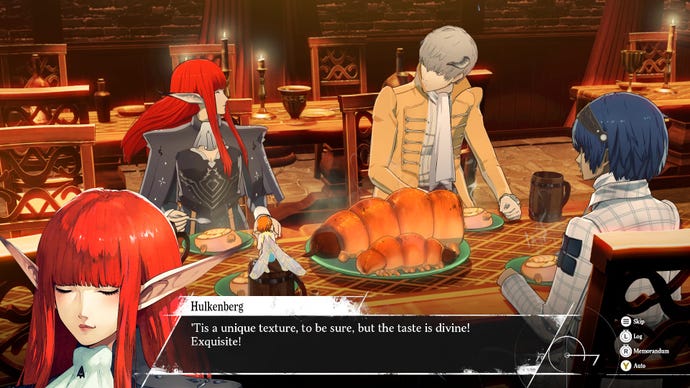
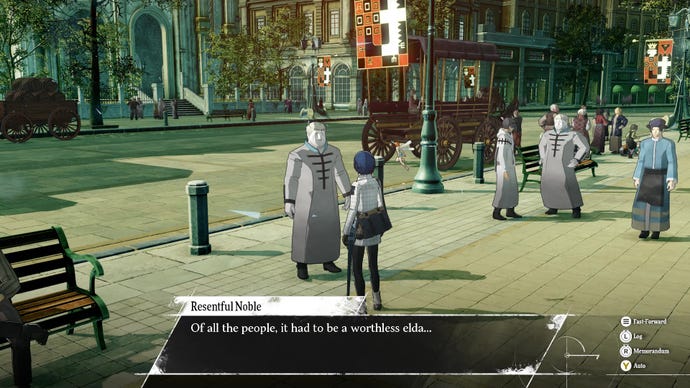
If you’re unsure who or what to spend your precious time on, you can chat to Gallica who’ll offer some assistance. She’ll point out folks who might want to chat, bounties you might want to prioritise, and the like. It’s genuinely really helpful! |Image credit:Rock Paper Shotgun/Sega
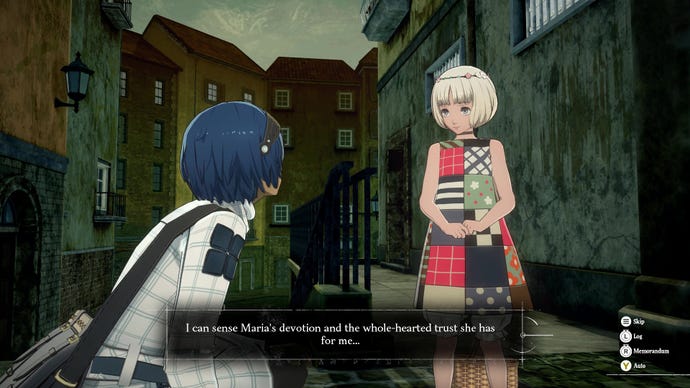
That’s not to say I don’t enjoy chasing new Archetypes and battling monsters, I just think Metaphor’s combat focus can grate just as much as it pleases. For newcomers and Persona fans who want a bit more variety, I think it’ll do the job. For real strategy buffs? I don’t think it allows enough freedom. For me, I’m happy enough with it.
In other matters, I don’t think Metaphor quite has… The Juice.
Despite my whining here at the end, I do genuinely believe Metaphor is a very good RPG and a grand adventure absolutely worth undertaking. It’s slick in its presentation, in its storytelling, and especially in its combat. Everyone, no matter if you’re a strategy god or a story hound will be served a good slice of both, perhaps spurring on more of an interest in the one side you hadn’t explored before. And it’s a bettergamethan Persona, particularly Persona 5. But I think its focus skews more towards combat and less towards its characters, which makes it more of a thing that you’ll put down and go, “that was really great”, and not, “I want to exist here forever with my pals”.